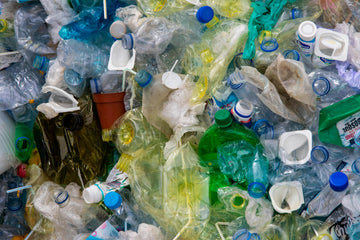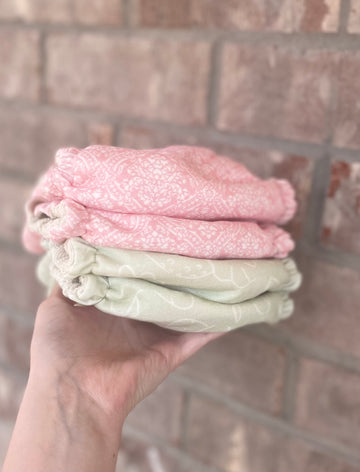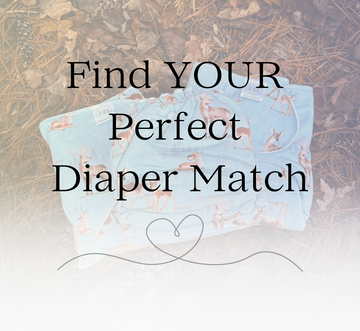This post has been a long time coming, we've been quietly working behind the scenes, testing innumerable materials, and tracking down new suppliers to make this dream a reality. Here's the thing; I like bamboo. Or bamboo viscose, more accurately. It has a lot of perks. It's incomparably soft, smooth, stretchy, and comparatively cheap against options like US grown cotton. It's easy to see why this once niche textile has taken. the. cloth. market. by. storm.
We fell in love with it, and we've happily offered bamboo products for several months now. As Highland Baby has begun to move in a more niche direction though, the time came when our love affair with viscose started to show some issues. For one thing, we are committed to only offering the best, and only telling the truth. The truth is, bamboo isn't the magical textile it's purported to be, and in fact it isn't a natural fiber. Now this isn't news, we've been telling you that for a while now, but digging a little deeper, here are more reasons why (for us) it's time to say goodbye.
1. Transparency
Something severely lacking in the cloth industry, I have never been satisfied by the level of transparency bamboo suppliers offer. Perhaps for large companies, where a trip to the factory and working directly with the manufacturer are options, this wouldn't be such an issue. However since I can't do that, I have found that we (and everyone else) largely rely on incomplete information, and a whole lot of "taking people's word for it". For example, much of viscose processing has moved to closed loop systems, so I've been told. Not working with manufacturers who have any oversight over this, I have no way of verifying that information. Bamboo is not organic, it cannot be, and therefore GOTS (Global Organic Textile Standard, the organization I usually rely on to tell me whether a supplier is living up to their promises) has absolutely no certifications or oversight here. This is important because in a closed loop system, the chemicals used in viscose processing are recycled and used again, instead of being dumped into the environment.
2. Health Concerns
Not for consumers (bamboo viscose is safe) but for workers. Again with the oversight problem. The harmful chemicals used for viscose processing are extremely toxic for the works who handle them on a daily basis. Hear me out - I know not all factories are created equal. Perhaps some of them are wonderful (I've had the privilege to work with at least one who is) but it stands to reason, with all we know about labor rights violations, that some - if not many of them, are not. I like bamboo, but not enough to think that a worker could have lifelong health problems, because I and others like me, like soft fabric.
3. Durability
Non-plastic textiles are biodegradable, which is awesome, but it also means they wear down faster than synthetic materials. This is especially noticeable with bamboo, which is even weaker than cotton or hemp due to the viscose process. Ever washed bamboo jammies? On a hot, heavy duty cycle? They pill faster than cotton. Diapers need to be extremely durable. Kids poop in them and the cleaning process is NOT gentle. As someone who does not have the patience for the low heat drying we recommend, my diapers often look worn out well before their time. Bamboo just isn't meant for harsh washing. This makes it a questionable candidate for diapers. Now combined with cotton, it makes for a more durable textile, but at that point, why not just use cotton?
4. Absorbency
We've got some pretty absorbent diapers, but we can always do better.
5. Cotton Issues
All bamboo we buy is mixed with cotton for strength. Cotton itself comes with some issues pertaining to ethical sourcing. I do not use cotton that is not organic, but working with a supplier that has CERTIFIED organic cotton is practically impossible. This goes back to the oversight issue. US knit bamboo/cotton is a slightly better choice because there is more oversight, but those materials are 1.5x as expensive as the run-of-the-mill bamboo other companies use. Still, as a matter of principle, we use the higher quality, thicker, US knit bamboo, but when the average consumer is weighing their options "does this business use domestic fabrics" is not usually their top consideration. In fact, textile processing/origin isn't at the top of very many consumer minds at all. Whether this is due to a lack of advocacy around the topic, the economy, or general apathy I do not know. It's not fun being the person that goes around trying to trace their materials back to the farm. It's a draining hobby
What do we do instead?
The obvious answers were hemp and cotton, but wanting to be at the forefront of quality and innovation, we couldn't just stop at any old hemp/cotton. You see many of the diaper materials on the market today come from just a few different sources. If you have 2 handmade diaper companies you really like and they seem to have similar materials, they may in fact be the exact same material. There is a lack of diversity in materials in this industry. So we knew we did not want to pick the same hemp that 5 other companies were out there using, so we did something different, and went right to the manufacturers.
Enter our luxurious, soft, stretchy, and extremely absorbent hemp. You don't usually associate those first 3 qualities with hemp now do you? I knew if I was going to get my hardcore bamboo customers on board with hemp I was going to need something very special, and this one checks all the boxes.
In addition to appealing to our senses, this hemp also satisfied my health and ethical concerns. Working directly with the manufacturer, I got an entirely new level of transparency. The company I work with is American, with their own factory in China. They share my never ending ethical concerns, and not only is the cotton certified organic by GOTS, but the hemp is as well. GOTS has some of the absolute highest standards, and they also ensure ethical production (GOTS social criteria)*
Hemp (also non GMO) is also much more sustainably processed, with fewer harsh chemicals.
Why can't we just get US hemp? Unfortunately Made in the USA hemp textiles are not really a thing at this point. Prior to The Farm Bill of 2018, hemp was rarely grown in the US. This is changing, thankfully, but we are not at the point where the hemp textiles industry is ready to take off, or even exist at this point. There is extremely expensive equipment required to process hemp, and even once/if the industry takes off, it will still face the same challenge the cotton industry does: overseas production will still be vasty cheaper.
So here's to a new era for Highland Baby, another step towards BETTER, and here's to educating every consumer as to why each choice has an impact.



